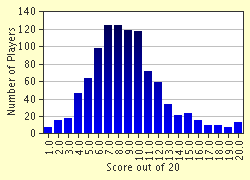Quiz Answer Key and Fun Facts
1. Of the following naval engagements, which happened first?
2. These are all nineteenth century military disasters. Which happened first?
3. Of the Victoria Cross and the Congressional Medal of Honor, which came into existence first?
4. All of the following figure in Canadian history. Which occurred on the earliest date?
5. The reign of Queen Victoria saw the British engaged in numerous 'little wars', as well as a few larger conflicts. Of the following, which happened earliest in that long reign?
6. American forces also fought a number of smaller wars during the nineteenth and early twentieth century. Which of the following campaigns was the first?
7. Which of the following early twentieth century conflicts was the first?
8. During WWI, which of these events happened (or started) first?
9. The First World War was conducted largely on land, but which of these naval actions was the earliest?
10. World War One featured a number of 'sideshows' away from the Western Front. Which event connected with these lesser campaigns was the first chronologically?
11. Which of the following WWI airmen was the first to die?
12. During which battle were tanks first employed?
13. During which twentieth century conflict was the term 'Fifth Column' first used?
14. Which of the following WWII ships was the first to suffer its fate?
15. The Battle of Britain, taking the dates 10 July to 31 October 1940 as those of the Battle, can be considered as having five phases. Of the four types of attack listed, which typified the earliest phase?
16. Of the following Second World War 'operations', which happened first?
17. In the 'island-hopping' campaign in the Pacific, which was the first island to be retaken by US forces?
18. After WWII the Far East saw numerous conflicts large and small. Which of the following events in that region most closely followed the end of WWII?
19. Of the following events associated with the Cold War or rebellion against Soviet domination, which came first?
20. The 1982 war in the Falklands (or Malvinas, if you will) was short but eventful. Which of the following was the first to occur?
Source: Author
spanishliz
This quiz was reviewed by our editing team before going online.
Any errors found in FunTrivia content are routinely corrected through our feedback system.

